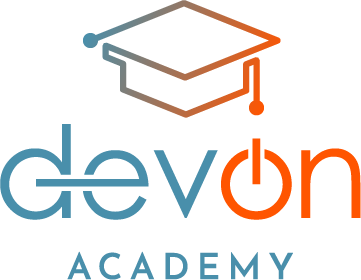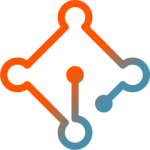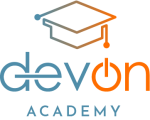A DevOps Role-based Education Approach
DevOps Learning Journeys
Professionals in a DevOps Organization must have a balance of soft, process, functional and relevant technical skills. When transforming to DevOps, collaboration, cooperation and acceleration at its core. In cross-functional teams, with a focus on continuous delivery and adding value, we distinguish 7 principle roles, for each of which we have created a learning journey.
DevOps in any organization is practiced differently, this is the same for these journeys. The organization may expect different skills from people even though they appear to have a similar role. To truly understand the need of you and your organization, please feel free to get in touch and we will grab a cup of virtual coffee to personalize the journey for you.
T-Shape professionals are important for this because they cannot only perform tasks within their own specialization, they can help their teammates out. Also because they understand them and their jobs better, communication and collaboration improve. To establish this profile, you need to go beyond your own limits and learn things outside the scope of your expertise.
The DevOps Leader is responsible for both process and people. They must promote the benefits of DevOps by identifying and quantifying the business benefits. Moreover, they remove the fear of failure and build a learning culture where it is safe to fail, to fail fast and to learn and improve.
Core Competency
- Vision
- Intellectual stimulation
- Inspirational communication
- Supportive Leadership
- Personal recognition
- Autonomous teams
- Distributed Agile teams
- Collaboration across teams
- Agile and Lean principles
+ T-shaped Skills
- Kanban
- Agile Software Development
- DevOps
- DevOps Mindset
- Diversity and inclusion
- Safe environment
- Trust
- Collaboration among teams
Product Owners ensure fast and efficient delivery and as the voice of the customer. They’re responsible for prioritization, stakeholder management and creating the ultimate product. Within DevOps, POs need to understand the technical landscape and possibilities better than they were used to. Foundational knowledge of Security, CD and Cloud is no longer optional.
Core Competency
- Work in small batches
- Make flow of work visible
- Gather & implement customer feedback
- Team Experimentation
- Limit work in progress
- Visual management
- Feedback from production
- Lightweight change approvals
+ T-shaped Skills
- Shift left on security
- Continuous Delivery fundamentals
- Monitoring
- DevOps Mindset
- Agile & Lean values
- Safe environment
- Personal recognition
The automation expert, often called architect finds the proper tools and implements processes which can automate manual tasks. They have the core automation role across DevOps tools and Cloud platforms. They are able to advocate lean thinking across processes.
Core Competency
- Loosely coupled architecture
- Microservice architecture
- Cloud hosting (PaaS/Iaas/Serverless)
- Immutable infrastructure
- Event-driven architectures
- Bus & broker architectures
- Object-oriented analysis design
- One modern OO language
- Rest API design
- Anyone (AWS / Azure / GCP)
- NFR Analysis
- UML / Architecture documentation techniques
- Software design patterns
- Cloud architecture patterns
- Authentication / Authorization
+ T-shaped Skills
- Continuous Delivery
- Frontend frameworks / JavaScript
- IAM (Identity access & management)
- Scripting (PowerShell / Python etc)
- Security
- DevOps Mindset
- Agile & Lean values
- Automate everything
- Collaboration across teams
- Stakeholder management and communication
Developers and testers are at the heart of every successful DevOps organization. Of course they turn requirements into code and test it to see if it meets business requirements but they are also responsible for unit testing, deployment and continuous monitoring. This makes it a critical role with many aspects which may need a personalized journey.
Core Competency
- Automated Deployment Process
- Test Data Management
- Test Automation
- Version Control
- Trunk based development
- Continuous Integration
- Database change Management
- Monitoring
- Proactive Notifications
- Programming Language/Skills
+ T-shaped Skills
- Cloud technologies
- Shift-Left security
- DevOps Mindset
- Agile & Lean values
- Collaboration
- Diversity & inclusion
The QAs, or XAs are responsible for User Experience and that the product has the features defines in the original specifications. However, they do not only test functionality but now also include experience testing.
Core Competency
- Requirement analysis
- Test Planning
- Test Data Preparation
- Test Automation
- API Testing
- Black box testing techniques
- Unit testing
- Responsive/Browser Testing
- Exploratory testing
- Usability testing
- Grey box testing
- Risk/Impact based Testing
- Automation Framework Design
- API Automation
- Test and Quality Management
- Mocking/Proxying APIs
- Debugging
- Strategizing Quality end to end
- Whitebox testing
- Performance Testing
- Security Testing
+ T-shaped Skills
- Programming Languages
- SQL
- Continuous Integration
- DevOps Tools
- Version control
- Branching strategy
- Understanding Technical debt
- Testing techniques
- Agile and Lean mindset
- Clear and transparent communication
- Product and Value-oriented
- Systems thinking
- Innovation in process and practices
- Stepping outside comfortable zone
- Focus on customers needs
- Continuous improvement
- Tracking and reporting
- Inquisitive and collaborative
The DevSecOps Engineer assures the security and integrity of an application in a DevOps organization. They work side by side developers and ensure built-in security. The DevSecOps Learning Journey helps you understand the fundamentals of designing secure systems and incorporating ‘security’ at a higher level or building ‘security in’ so to speak.
Core Competency
- Security as a feature
- Threat modeling
- Resilience engineering
- Compliance & governance
- Vulnerability testing
- Developing security protocols
- Implementing and upgrading security measures
- Maintenance of security systems
- Security breach investigation
+ T-shaped Skills
- Cloud Security
- Container Security
- Mobile Security
- Tool/technology-specific security
- DevOps Mindset
- Agile & Lean values
- Vision
- Safe environment
A Site Reliability Engineer (SRE) is one of the roles in a DevOps organization who has an extremely broad reach. This role incorporates aspects of software engineering and it applies those to problems in both infrastructure and operations. Because of their knowledge and influence, they create ultra scalable and highly reliable distributed software systems.
Core Competency
- Service Level management
- Eliminate Toil
- Observability
- Incident response
- Monitoring
- Enabling scalability
- Reliability testing
- Load Balancing (front-end & datacenter
- Handling overload
- Managing critical state
- Data processing pipelines
- Data integrity
- Product Launches at scale
- Release Engineering
+ T-shaped Skills
- Cloud technologies
- Scripting basics
- Provisioning technologies
- Container technology
- Programming languages
- Impact/performance-oriented
- Agile & Lean values
- Safe environment
- Embrace Risk



